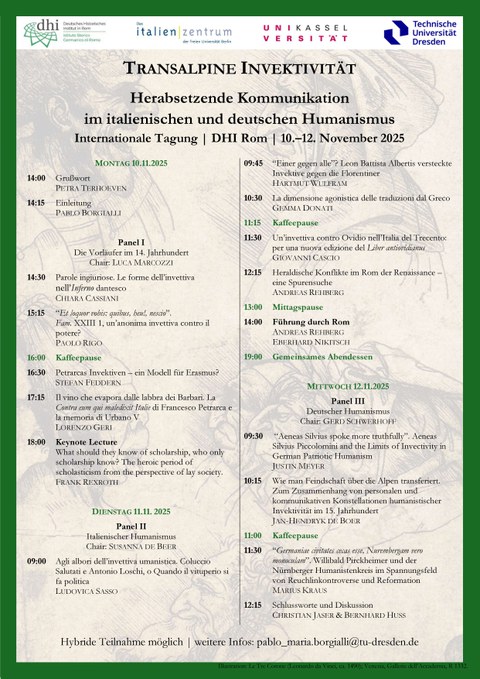Tagung "Transalpine Invektivität. Herabsetzende Kommunikation im italienischen und deutschen Humanismus"
Datum: 10.-12. November 2025
Ort: DHI Rom, Via Aurelia Antica 391, 00165 Rom
Anmeldelink beim DHI Rom
Bitte beachten: Zum Keynote-Vortrag von Frank Rexroth ist eine separate Anmeldung nötig (weiter unten auf derselben Seite).
Auch eine Anmeldung zur Keynote allein ist möglich.
Beschreibung der Tagung
In den Prozessen der Gruppenbildung, sei es in politischen oder in kulturellen Kontexten, spielt der Einsatz von angreifender Kommunikation, d. h. Invektivität im weitesten Sinne, eine unentbehrliche Rolle: das lässt sich damit erklären, dass jede soziale, politische oder kulturelle Gruppe einen Sündenbock, einen gemeinsamen Feind braucht, der dazu beiträgt, eine Stimmung der kollektiven Identität zu erzeugen und aufrechtzuerhalten; diese „Asymmetrisierung“ bzw. asymmetrische Positionierung der eigenen Gruppenzugehörigkeit sowie der der „Anderen“ ist eine notwendige und unabdingbare Voraussetzung für die Geltendmachung von politischen oder kulturellen Agency-Ansprüchen.
Diese Annahmen sind fast für jeden Zeitpunkt in der Geschichte gültig, erlangen sie aber im Kontext des sogenannten Renaissance-Humanismus des 15. und 16. Jahrhunderts eine besondere Bedeutung. Auch ohne sich auf die kontroverse Frage der Bestimmung des Humanismus einzulassen, kann man leicht den auffällig polemischen und invektivischen Charakter eines Großteils der Produktion der Persönlichkeiten erkennen, die sich selbst als Teilnehmer der Bewegung anerkennen und selbstvorstellen; dabei spielt Francesco Petrarca, wie in vielen anderen Hinsichten, eine bahnbrechende und grundlegende Rolle, mit seinen gewalttätigen Angriffen gegen die kulturellen Alternativen der zeitgenössischen Kultur. Die Ausbreitung und die Rezeption seiner Texte, bzw. ihre „transalpine Diffusion“ (J. Helmrath) ist die Grundvoraussetzung für die Ausprägung der herabsetzenden Kommunikation von italienischen und deutschen Humanisten.
Ziel der Tagung ist daher, einzelne Phänomene der Gruppenbildung durch die herabwürdigende Kommunikationsform als case studies zu beobachten (z. B. die Spaltung innerhalb von Florenz zwischen den Anhängern der Adelspartei und den Teilnehmern des Zirkels um die Medici, die den Hintergrund des Austausches von invectivae zwischen Poggio Bracciolini und Francesco Filelfo bildet), und gleichzeitig die vergleichende Entwicklung der Kommunikationsform zwischen Italien und Deutschland zu verfolgen (z. B. die Rezeption des berüchtigten Liber sine Nomine Petrarcas in den deutschen Kreisen der Humanisten).
Call for Papers
Den Call for Papers zur Tagung finden Sie auf H/SOZ/KULT. Die Deadline für entsprechende Einreichungen war der 17.04.2025.

